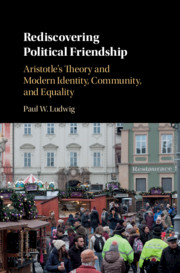Book contents
- Rediscovering Political Friendship
- Rediscovering Political Friendship
- Copyright page
- Dedication
- Epigraph
- Contents
- Preface and Acknowledgments
- Introduction
- Part I Foundations of Friendship
- Part II Where Is Civic Friendship Today?
- 3 Why Associations Replaced Civic Friendship
- 4 Why Associations Are Really Civic Friendships
- Part III A Different Way to View Liberalism
- Part IV Conclusion
- Works Cited
- Index
3 - Why Associations Replaced Civic Friendship
Altruism Conspires with Self-Interest to Produce the “Free Rider”
from Part II - Where Is Civic Friendship Today?
Published online by Cambridge University Press: 12 December 2019
- Rediscovering Political Friendship
- Rediscovering Political Friendship
- Copyright page
- Dedication
- Epigraph
- Contents
- Preface and Acknowledgments
- Introduction
- Part I Foundations of Friendship
- Part II Where Is Civic Friendship Today?
- 3 Why Associations Replaced Civic Friendship
- 4 Why Associations Are Really Civic Friendships
- Part III A Different Way to View Liberalism
- Part IV Conclusion
- Works Cited
- Index
Summary
Liberalism’s substitute for civic friendship is the Association: citizens associate to pursue their interests, according to modern theory. Yet empirical evidence shows we also join for motives of honor, pride, and the wish to cooperate. While economic models of politics (“formal models”) fail to capture these mixed motives, our modern ideal of altruism further debilitates associations by considering them low, selfish pressure groups. Associations have thus fallen on hard times, and the individual often faces off against the Leviathan state, with no mediating association. Recent attempts to improve on formal models—projects to reinvigorate the morality and rationality of cooperation, such as those of Jane Mansbridge and Richard Tuck—could benefit from Tocqueville’s comparable attempt to create an ideology of “rightly understood” interest, whereby Americans could disguise their morality as rational when it in fact relied on vestigial altruism (“disinterested and unreflective sparks that are natural to man”). Going back behind Tocqueville to excavate civic friendship would at least bring theorists, if not citizens, back into a more realistic picture of what is actually going on.
Keywords
- Type
- Chapter
- Information
- Rediscovering Political FriendshipAristotle's Theory and Modern Identity, Community, and Equality, pp. 133 - 161Publisher: Cambridge University PressPrint publication year: 2020



